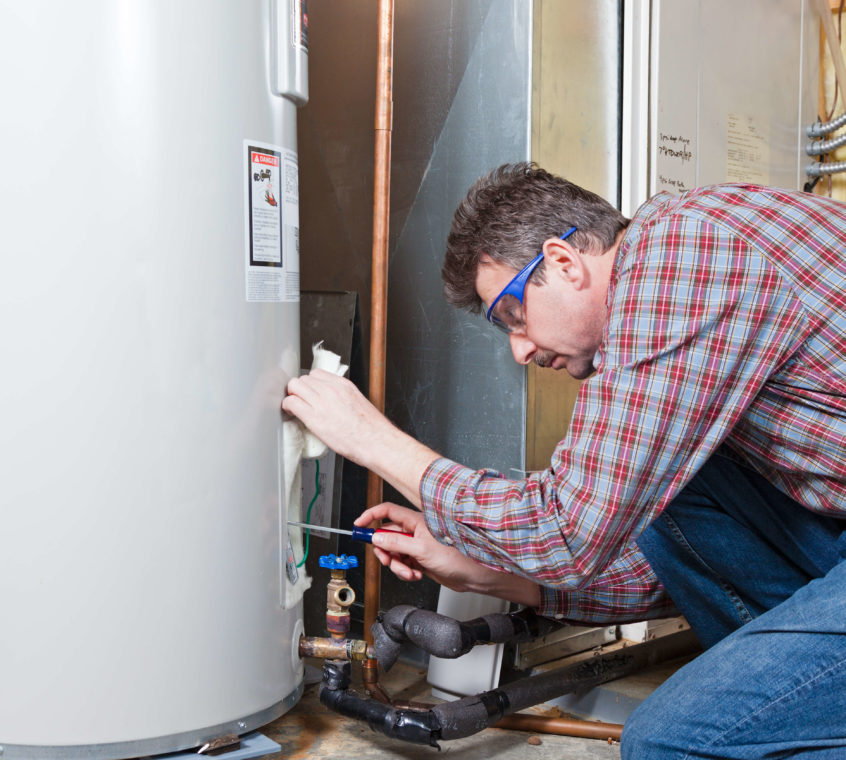How to Prevent Water Heater Damage

When people think about damaged homes, often their minds go straight to fire, and rightfully so: fire is devastating! But it’s important to remember that water can be just as destructive to a home. We have a variety of good tips on preventing water damage in your home in Twin Falls, Burley, and Meridian. But what if we narrow it down a bit more?
Let’s talk about water heaters.
Water heaters are a vital part of almost every home – as their name suggests, they do heat our water after all! But they’re also one of the major causes of household water damage. According to Disaster Safety, the average cost of damage repair due to a faulty water heater (even after the deductible gets paid) is close to $4500, and “69% of all water heater failures result from a slow leak or sudden burst.” (If you’re curious to see what kind of damage a burst water heater can inflict, check out this short video!)
So how do you prevent water damage cause by your water heater? Here are a few ways.
- Determine If It’s Time to Replace or Repair. A good rule of thumb: if your water heater is around 10 years old, it would be wise to consider purchasing a new one. You can find plenty of information on the different types of water heaters here. Prices for a new unit tend to run in the $500 to $800 range, although there are some that cost less and some that cost more. Still, you want to make sure you’re getting a good quality product that will last. However, you may just need to replace a piece on your water heater and not the entire unit.
- Maintenance. Just like with your car, regular maintenance is important to ensure the health of your water heater. Here are a few ways to do this:
- Drain your water heater once or twice a year to increase your unit’s efficiency and remove build-up. If not removed, this build-up can lead to corrosion!
- Lower the thermostat on your water heater – keeping it around 120 degrees Fahrenheit is a safe bet to prevent overheating.
- Check the pressure-release valve every few months and replace if necessary.
- Inspect the anode rod at least once a year (especially after the warranty has expired!). This rod helps prevent corrosion in your water heater’s tank and can be replaced if needed.
- Flush out your water heater periodically – about every 4 to 6 months is a good rule of thumb. This can be done by taking about a quart of water from the storage tank and running it through or connecting a basic garden hose to your water heater’s base valve.
- When in doubt, call your plumber and get an annual inspection!
- Know Where the Main Shut-Off Valve Is! This is probably the most important aspect of preventing water damage in your home. Once again: KNOW WHERE THE MAIN SHUT OFF VALVE IS! This simple piece of information can literally prevent thousands of dollars in damages. If you’re going to be gone for a few days (especially during the cold winter months), be sure to shut off the water in your home. This helps prevent pipes from freezing during the winter, or other potential breaks that may occur suddenly throughout the year. Knowing how to shut off your water is also vital for if your water heater has a leak while you’re home. You can shut the water off immediately, giving you time to clean up, contact a professional for an inspection, or to replace your water heater before any more damage can occur.
These are just a few ways to help you prevent water damage in your home. Sometimes of course, we can do everything right and situations still occur. If you experience any kind of water damage caused by your water heater, don’t hesitate to contact your local Elite Restoration office. We have 24-hour emergency service every day of the year, with less than an hour response time and are always happy to help.
One final piece of advice: if you’re building (or plan on building) a home, consider installing a floor drain and keeping your water heater in that area to help minimize damage if a leak or burst ever occur.

